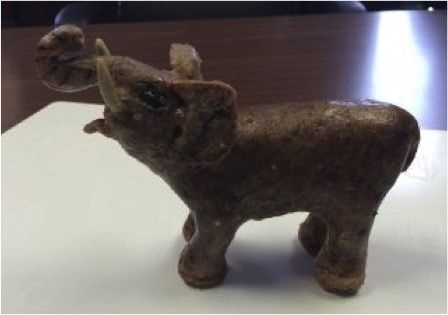
Identity
Fighting My White Male Privilege—A Confession
Addressing white male privilege strengthens anti-oppressive practices—I hope
Posted November 1, 2016

I was preparing the Keynote address I would be delivering for the Canadian Art Therapy Association/Ontario Art Therapy Association Joint Conference on October 14th. The conference theme was Art Therapy and Anti-Oppressive Practice; my presentation “Drawing Out the Oppressed: Promoting Identity and Empowering the Vulnerable through Art Therapy” drew from my own work in one of the most oppressive environments—prison.
However, while I had spent months putting this together, I felt vaguely uneasy. And then, the Sunday before I was to deliver the Keynote, it occurred to me what was missing.
I was reviewing my PowerPoint while watching the second presidential debate. After the debate I became frustrated, embarrassed, self-conscious. I spent 90 minutes watching a self-described alpha male justifying his nasty statements about women as locker room talk, watched him lurk closely behind her in what I perceived as a threatening and domineering manner. And, many people excused it simply because he was a strong white man.
As a white man, I felt part of the system that allowed this to happen. I looked down at my notes. I realized what seemed off; speaking about anti-oppressive practice without addressing my own identity felt disingenuous. So I re-wrote my introduction.
The conference audience held hundreds of people, the majority of which were women. This is common in our field; the latest numbers recognize that well over 90 percent of art therapists are women.
I began the presentation with a slide on the screen of a large elephant:
“My presentation is called Drawing out the Oppressed: Promoting Identity and Empowering the Vulnerable”And yet, as I look around this room and consider our field at large, I need to call attention to what I perceive as a fairly large elephant in the room.
You see, I recognize that those who oppress are usually self-perceived as part of the dominant culture, the top of an apparent hierarchy established by the society to which we belong.
Now, this brings me to [this] elephant…
I don’t know if you know this or not, but I am going to tell you something very personal about myself…something many people may not know…
Here it is.
[I whispered] I’m a white guy
As I was working on this Keynote, it slowly dawned on me that I was being asked to present on empowering the vulnerable and promoting the identity of the oppressed as a…
…White guy
And even more so, a white guy from the United States
I am being asked to focus on a topic that many recognize—in my opinion correctly—that those who share my identity actually contribute to the disparities and disproportions common in our society.
While I haven't always recognized this, I have come to see it recently, particularly over the last few years, and dare I say it—clearly during this latest election occurring just south of all of you…[oh, and by the way, given the comments made by one of the presidential candidates about Canada—I’m sorry; we don’t all feel like that]
I do indeed recognize the hypocrisy.
And, I also confess, while my awareness of white male privilege has emerged slowly over the years, there has risen my own recognition that I— and my ilk— represent and promote the power imbalance inherent in many of our countries and cultures.
Granted, you do have Trudeau [prime minister of Canada], and might I add, how very jealous I am…
Please bear with me; I feel I need to say this before I begin the actual topic at hand—I felt I couldn’t be honest unless I recognize the position of power from which I work.
I bring this up to neither apologize nor brag—while being a white man doesn’t provide me any greater insight it doesn’t conversely negate my position…
I point all this out so that we can work through this conspicuous and inconvenient truth and segue into relating the difficult and challenging work that we— or I— experience as an art therapist providing services for those who are oppressed, either by dominant cultures or by dominant justice systems.
I have had to keep all this in my mind that despite my attempt to overcome the disparities, to acknowledge and recognize the oppression within our given cultures, I am speaking from observation and very little from direct experience.
But I have seen it and I acknowledge it.
So, let me begin…”
By learning there are multiple perspectives, not just one put forth by the dominant paradigm, I am more likely to recognize that I don't know what the other person is experiencing, and therefore can indeed be more effective—as a therapist, teacher, professional.
Don't get me wrong. My own sense of superiority developed through my position of privilege continues to raise its ugly head at the most inopportune times—but I am getting better at recognizing it. It is a continuous effort.
At first, when people would tell me, “you cannot possibly understand where we are coming from as you are perceiving this from a position of privilege” I would get my hackles up; they don't know me— I had no privileges growing up.
I had struggles; I had challenges. I didn't always have money. I had difficulty in school; I worried about work. As a Jewish man, I have encountered forms of anti-Semitism and racist bigotry. But, years ago, a colleague once described me as a member of “an invisible minority.” While I took affront to that then, I seem to now understand what he meant.
I carried the most obvious and visible of privileges.
Yes, some perceive that as a “male art therapist” I must know what it feels like to be part of a minority.
However, while I am a white man in what Gladys Agell (Fago, 1989) described as a women’s field, I am part of a women’s field in what is societally still perceived as a man’s world.
Yes, I have had to overcome some things to get where I am. Yet, a person of color, a woman, beginning with the same limitations would have so much more to overcome, would require a great deal more energy, time, luck, before arriving at a similar place. For some, it may even take generations. Even when “arriving”, their positions might still be suspect, that they succeeded because of who they knew, legislation that “favored” them, reluctant opportunities provided out of guilt and obligation.
Yet, no one would suspect me.
Let’s be honest. I don't have to be afraid walking home alone at night. I don't have to worry about what may occur when I get pulled over. My salary is based on my merit and worth, not limited because of my gender or identity.
Previous posts have examined the question of identity—my own as an art therapist [link provided here], and those with whom I serve [link provided here]. In order to provide the work that I do, in prison, I recognize that there is a hierarchical imbalance, and that part of my job is to help those inside create new identities and labels, to once again take back power, and rise above the identity of that of “inmate”.
Yet, I left out this most important piece. I was reluctant to do so. Even now, I must confess, writing this blog has been daunting.
I read a recent article in The New Yorker in which author George Packer examined some of the tasks Hillary Clinton has had—and will have—in bridging the ever widening gaps between white America, and…well… everyone else.
Packer acknowledged that many people—particularly some who are more left-leaning—feel their white identity precluded them from discussing race and identity. On some level they felt they had no right to bring up that which they helped create.
“If racial injustice is considered to be monolithic and unchanging—omitting the context of individual actions, white and black—the political response tends to be equally rigid—genuflection or rejection. Clinton’s constituency surely includes many voters who would welcome a nuanced discussion on race…But identity politics breaks down the distinction between an idea and the person articulating it, so that before speaking up one has to ask: Does my identity give me the right to say this? This atmosphere makes honest conversation very hard, and gives a demagogue like Trump the aura of truth-teller…when people of good will are afraid to air legitimate arguments the illegitimate kind gains power” (2016, pg. 56)
While Packer focused on the color of one’s skin, the argument extends to sex, gender identity and religion as well. We are reluctant to admit this out loud because we are afraid of how we may sound. Or, let me own this—I am reluctant to admit this…
Packer, in a few paragraphs later, seems to let us off the hook. Restating what social scientist Glenn Lowry of Brown University said, “the new racial politics actually asks little of sympathetic whites: a confession, a reading assignment” (2016, p.56).
Perhaps this is my first step in contributing to the discussion of racial politics—my own written assignment.
Certainly, some may find this post disingenuous, written from a position of superiority, and people on both sides of the issue may take umbrage to my statements.
Some could argue—and perhaps rightly so—why is it that a white man can get away with making these statements but if a woman or a person of color does so, he or she is complaining, is rocking the boat, is picking a fight?
I don't know really know why, but I suspect it is likely because of what Clinton referred to as implicit bias.
To that, I ask that you accept the message and don't condemn the messenger.
As an art therapist in prison, I have primarily worked with inmates of different color and background.
As a professor of art therapy, I have taught classes made up mostly of women.
As a chair of a department in a large state university I represent and answer to many people of diverse and varied backgrounds and experiences.
As a professional art therapist, lecturing, holding office, running committees, I represent a field of which I am only one of a handful of men.
For years, I have taught theories derived mostly from Western Eurocentric perspectives, not recognizing that when Jung refers to “primitive cultures” this is derogatory to certain cultures and identities. The white male dominant perspective influenced even the women who have founded and shaped our field. This needs to change.
I have learned to be aware of my identity, and from whence and to whom I speak. I have also come to accept, albeit slowly at times, that I do not always come from a position of understanding.
Like I indicated in the Keynote’s introduction, I speak from observation but very little from experience.
However, in order to be an ally, it is important to listen to people who have experience with racism and structural oppression. I am not always good at this, but I am learning to listen and to accept I don't have all the answers.
But I have seen the disparities, and I acknowledge it.
-------------------------------------------------------------------------
Fago, D. C. (1989). A diversity of gifts: Vermont women at work. Woodstock, VT: Countryman Press.
Packer, G. (2016). Hillary Clinton and the populist revolt: The Democrats lost the white working class. The Republicans exploited it. Can Clinton win it back? New Yorker, Oct. 31, 2016



